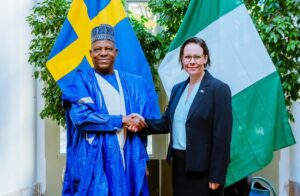Digital economy key to Nigeria’s economic transformation, says lawmaker
By Philip Yatai
Rep. Gaza Gbefwi, Chairman, House Committee on Solid Minerals, says digital economy holds the key to Nigeria’s economic transformation, job creation, and national security.
Gbefwi, representing Karu/Keffi/Kokona Federal Constituency, stated this in Abuja on Friday, at a seminar with the theme, “Powering Nigeria’s Digital Economy through Advanced Information Management Paradigms”.
The seminar was organised by the Association of Applied Information Management Professionals (AAIMP).
Represented by one of his aides, Mr Emmanuel Kadiya, the lawmaker described digital transformation as the “bridge between today’s challenges and tomorrow’s prosperity”.
Gbefwi, who was the Chairman of the occasion, emphasised the urgent need for the youths to embrace digital innovation as a pathway to national development.
According to him, for Nigeria to thrive in the global digital economy, our young people must take lead by mastering information management and leveraging technology to create opportunities locally and internationally.
“Our youths must leverage technology to save Nigeria.
“We must move from building Nigerian products to creating global solutions. With a smartphone, you can establish a business worth N250 million.
“Technology is already fixing revenue leakages and transforming infrastructure.”
In a keynote address, Dr Peter Olumuji, Secretary, Command and Control Centre, Federal Capital Territory Administration, noted the global shift from traditional economies to digital systems.
Olumuji pointed out that Nigeria had developed a National Digital Economy Policy and Strategy under the Ministry of Communications and Digital Economy.
He also urged the youths to drive its transformation.
According to him, Nigeria must strengthen its broadband infrastructure across urban and rural areas to maximise the benefits of digital economy.
Similarly, retired Major-Gen. Chris Olukolade, Chairman, Centre for Crisis Communication, re-echoed Olumuji’s concerns on the need to strengthen broadband infrastructure.
Olukolade highlighted the strategic importance of real-time structured information in national security and emergency response.
According to him, reliable and coordinated information is not just useful; it is lifesaving.
“The digital economy we seek depends heavily on how effectively we manage and leverage evolving information infrastructure.”
He commended AAIMP for promoting cross-sectoral dialogue and reaffirmed his Centre’s support for efforts that strengthen intelligent information management nationwide.
Also, Vice Chancellor of Bingham University, Prof. Haruna Ayuba, described the seminar as timely and transformative.
Ayuba emphasised the role of education in driving digital innovation.
“To harness digital opportunities, we must reimagine strategies that encompass emerging technologies like cloud computing, blockchain, and big data analytics.
“Bingham University is committed to supporting national digital development through research, collaboration, and innovation.
“Our interdisciplinary departments are pushing the frontiers of data science and information systems,” he said.
Earlier, the AIMP President, Dr Omotola Afuye, emphasised the association’s mission in building a knowledge-driven future for Nigeria.
Afuye said that the digital economy thrives on structured data, timely information, and innovative systems that enhance productivity and decision-making.
“We are not just building an association; we are building a legacy of excellence in information management,” he said. (NAN)
Edited by Abiemwense Moru









